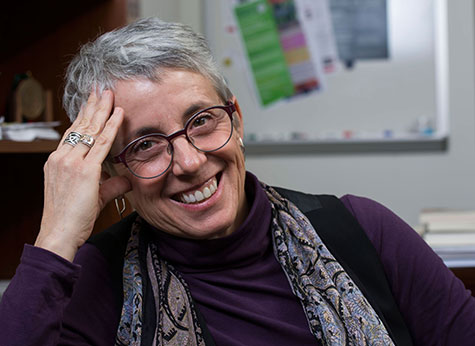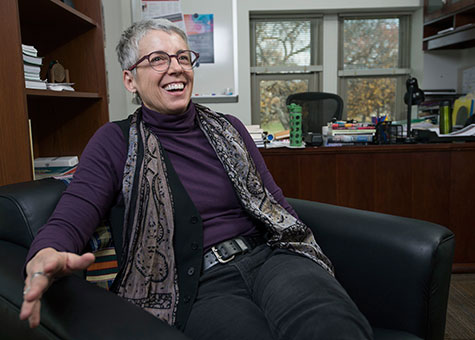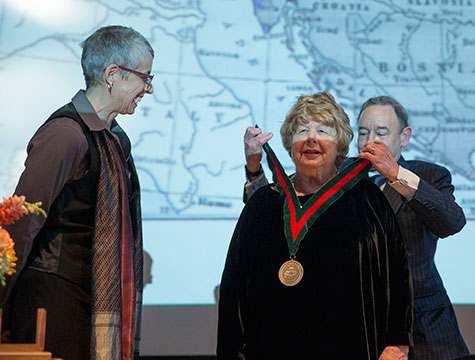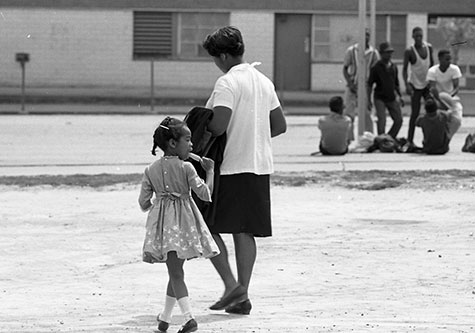
Jean Allman has had a busy year.
Last spring, Allman, PhD, the J.H. Hexter Professor in the Humanities in Arts & Sciences at Washington University in St. Louis, took on additional duties as director of the Center for the Humanities in Arts & Sciences. This fall, under her watch, the center has overhauled its website; hosted the Faculty Books Celebration and the James E. McLeod Memorial Lecture on Higher Education; announced the 2014 Washington University International Humanities Medal; launched the new Humanities Broadsheet; and added a pair of in-residence fellowship opportunities.
With the Sam Fox School of Design & Visual Arts, the center also has established The Divided City, a four-year project exploring segregation in St. Louis. We sat down with Allman to discuss some of these activities as well as the health — and nature — of the humanities themselves.
You were appointed director of the Center for the Humanities last spring. Tell us a little about your hopes for the program.
I work in African studies and was trained as a historian, but I’m profoundly interdisciplinary in the ways that I approach the past. I like igniting and mobilizing faculty interests across disciplinary boundaries and bringing people into new kinds of conversations.
It’s early in the process, but we’re spending much of this year in dialogue with all of the humanities departments and programs on campus. It’s our job to find out what they’re doing, to nurture and facilitate connections among them. We want to be an incubator for interdisciplinary research and interdisciplinary teaching.
We’ve also re-launched our website, to showcase what’s happening on campus, in the St. Louis region and in popular culture. And we’re working very hard to support humanities faculty in applying for external grants — everything from work-shopping and critical feedback to copy editing, reminders about deadlines and help with budgets. In the sciences, there are entire offices dedicated to that kind of support.

The public conversation about the humanities often seems to assume a state of crisis. Is that true? How would you define the health of the humanities today?
I think it depends on where you’re looking. In the United States, we’re certainly in a defensive posture when it comes to federal funding. But when you’re in the classroom, looking at the kinds of things people are actually doing — in the digital humanities, the medical humanities, performing arts — there’s real vitality and dynamism.
In other parts of the world, there certainly appears to be no crisis. Last summer, I went to a humanities conference in Hong Kong. It was rocking! In China, Ireland, Spain — the humanities seem to be thriving.
If there is a crisis, it’s a crisis of higher education. People look at the economy and the cost of tuition and then want to put a price tag on education as an investment. But when you really examine it, that argument doesn’t work. Students who major in the humanities are as likely to find employment as students who major in STEM fields, and the salaries are not as dramatically different, especially over the longer haul, as many assume.
In October, the center awarded poetry scholar Marjorie Perloff the International Humanities Medal, which carries a $25,000 cash award. Tell us about that.
The International Humanities Medal is the largest prize from an American institution to cover the broad spectrum of the humanities. So one year we have a filmmaker like Ken Burns or a food writer like Michael Pollan, and another year we have a novelist like Francine Prose or Orhan Pamuk.
This year, the unanimous choice was Marjorie Perloff, who is one of the most interesting, important and acclaimed voices in her field. Her selection was very exciting. It helped turn the campus conversation to issues of poetry, language and translation.

So what is the broad spectrum of the humanities? How do you, as director of the center, define the field?
For me, the humanities encompass all the various ways we try to make sense of human culture and of the human condition. In other words, we exist everywhere, including in the social sciences and natural sciences.
That’s an interesting point — that one might bring a humanities-based approach to virtually any discipline.
Absolutely. We’d love for all of our pre-med students to minor in the new proposed medical humanities program. One of the first courses I taught at Washington University was a socio-cultural look at women and men in African societies. Two students, both pre-med, had to miss a class because they were in a play. Both got into Harvard Medical School.
But that’s not our only value. Reading a poem, writing a poem, examining the world through words, images, music or performance. … These things, I think, are intrinsically worthy. They create joy.
Students get that. They need that space in their lives. I think a lot of students come here because we do those things well.
You and Bruce Lindsey, dean of architecture in the Sam Fox School, are principal investigators for “The Divided City,” a four-year, $650,000 Mellon grant focusing on the urban humanities. What drew you to the topic?
We have a wonderful cohort of faculty — writers, historians, filmmakers — working on various aspects of urban studies and the urban humanities. The idea was: ‘let’s get them in a room with architects, landscape architects and urban design.’ And it just clicked. The combination of expertise is fantastic.
I actually grew up in St. Louis but left when I was 18. It’s an odd place — colonized by the French, then the Spanish, then the French again. It sits between North and South, it has legacies of slavery and freedom, of racism and segregation. It’s not a “regular” Midwestern city, but it’s a fascinating place to pose these sorts of questions.
“Divided City” focuses on segregation, using St. Louis as a base but also reaches out globally to explore the ways in which urban space is divided by race, by class, by gender. The project includes faculty grants, research collaborations, interdisciplinary seminars, a robust online presence, an ongoing public life survey and, hopefully, some form of public exhibitions.
It’s an exciting project that really plays to our strengths as a university.
